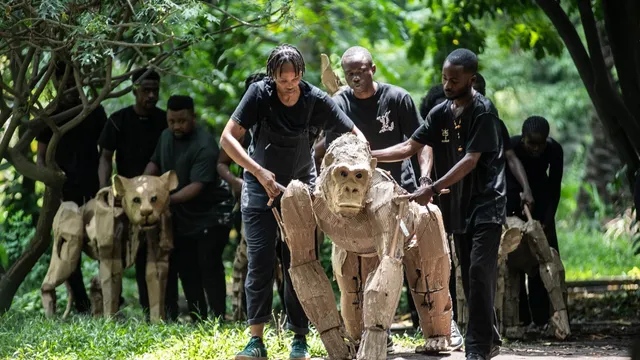
'The Herds' raises awareness about climate crisis through moving theater performance
2025-04-11 20:51- A moving theater performance called 'The Herds' began in Kinshasa, Congo, featuring cardboard puppet animals.
- The project aims to shed light on the climate crisis as these animals flee global warming impacts.
- The performance highlights the urgent need to protect the Congo rainforest, which has received less global attention.
Express your sentiment!
Insights
In Kinshasa, Congo, a striking theatrical performance began with a troupe of cardboard animals, including monkeys, a gorilla, leopards, and a giraffe, as part of a project titled 'The Herds.' This performance aims to bring attention to the climate crisis while depicting the plight of these animals fleeing from their natural habitats due to global warming. As the puppeteers, donning black attire, moved the cardboard figures through the Kinshasa Botanical Garden, they highlighted the real-world impact of climate change, with floodwaters from massive flooding earlier this week still evident in the area. The show marks the first step of a journey that will take these puppet animals from the Democratic Republic of Congo to the Arctic Circle, stopping in various cities along the way to raise awareness about the climate crisis. The organizers of 'The Herds' emphasize the importance of starting in Congo due to the country's status as home to the second largest rainforest globally, which serves as one of the planet's vital 'lungs.' Despite the significance of the location, there has been comparatively less global focus on the challenges facing the Congo Basin than on other rainforests. Congolese filmmaker and producer Tshoper Kabambi has stated that a primary objective of 'The Herds' is to highlight the neglect of nature by humanity, connecting the performance to both local and worldwide issues of climate change, deforestation, and more. The event also attracts several Congolese artists and will eventually see participation from different cultures as the project progresses further north. The performance was initially set to host a main event in Kinshasa's central area; however, heavy rainfall led to its cancellation. The project takes inspiration from 'The Walk,' a previous initiative focused on drawing attention to the refugee crisis by traveling through multiple countries, emphasizing the collaborative spirit and outreach of global narratives concerning displacement, whether from climate change or conflict.
Contexts
The Congo rainforest, often regarded as the "lungs of Africa," plays a critical role in maintaining global ecological balance. Spanning across six countries, including the Democratic Republic of the Congo, the Republic of the Congo, Cameroon, Central African Republic, Gabon, and Equatorial Guinea, it serves as one of the largest rainforests in the world, second only to the Amazon. The immense biodiversity found in this region includes millions of species of flora and fauna, many of which are endemic to the area. This diversity not only contributes to the ecological richness of the continent but also serves vital purposes for the planet, including carbon storage, oxygen production, and maintaining hydrological cycles. As the climate crisis intensifies, the importance of the Congo rainforest in regulating global temperatures and weather patterns becomes increasingly crucial. Additionally, the rainforest is vital for local communities, providing resources such as food, medicine, and materials for shelter and tools. Indigenous peoples and local communities depend heavily on the forest for their livelihoods and cultural practices. The sustainable use of these resources aligns environment conservation with socio-economic needs. Traditional knowledge and practices passed down through generations are essential in the preservation of the ecosystem and combating climate change. However, it is imperative that the voices of these communities be included in discussions regarding the area's management and conservation efforts. Despite its significance, the Congo rainforest is facing unprecedented threats from deforestation, illegal logging, mining, and agricultural expansion. The consequences of these activities extend beyond the local environment to global impacts, including increased carbon emissions and loss of biodiversity. Deforestation rates in the region are alarming, with vast areas falling victim to exploitation driven by global demand for timber and agricultural products. Initiatives aimed at protecting the rainforest are ongoing, but they often lack the necessary support and enforcement mechanisms, highlighting the need for international cooperation and increased funding for conservation programs. Preserving the Congo rainforest is not only essential for the region but is also a matter of global importance. The rainforest's vast carbon sink capacity provides a natural solution to climate change, making conservation efforts critical in combating global warming. Furthermore, the biodiversity contained within the region offers potential resources for medicine and sustainable practices. Global partners, NGOs, and local governments must collaborate to balance ecological preservation with the economic needs of the local populations. Raising awareness and promoting sustainable practices can ensure that the Congo rainforest continues to thrive for generations to come, securing its invaluable contributions to the planet.